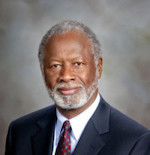DeWine friend worked for company that paid $1B in settlements
Dozens of disabled people staged a protest against proposed cuts to Medical, Medicare and Medicaid programs. File photo by Justin Sullivan/Getty Images.
A close, long-standing friend of Gov. Mike DeWine registered early this year to lobby on behalf of a giant Medicaid provider — just before Attorney General Dave Yost accused the company of ripping off tens of millions of taxpayer dollars.
The company, St. Louis-based Centene, later agreed to pay out $88 million to Ohio and $1 billion more to other states. But the Medicaid department and the governor’s office still won’t say whether DeWine friend and Centene lobbyist Michael Kiggin helped the company keep its massive contract with Ohio despite the fraud claims.
In response to an open-records request for written communications between Kiggin and the government, the Medicaid department last month said it was unable to search for them. Then it ignored questions attempting to clarify the matter — even though Ohio open records law requires it to help clarify requests.
The DeWine administration already was contending with major corruption issues when Yost sued Centene in March.
In July 2020, federal authorities arrested former House Speaker Larry Householder and four associates on charges that Akron-based FirstEnergy funneled $61 million to them through 501(c)(4) dark money groups and that they used the money to pass a $1.3 billion law. It bailed out aging nuclear and coal plants, gutted renewable energy standards and provided a $100 million-a-year subsidy to FirstEnergy.
DeWine signed the law. His appointee to the Public Utilities Commission was forced to resign amid revelations that he took a $4 million payment from FirstEnergy. And DeWine’s legislative affairs director — a former FirstEnergy lobbyist who set up one of the dark money groups — resigned late last month.
Centene’s Buckeye Health Plan handles billions in Medicaid money each year as it manages health care on behalf of Ohio Medicaid recipients. In his lawsuit, the attorney general accused the company of stacking pharmacy middlemen atop one another and using the resulting lack of transparency to massively overbill the state for prescription drugs.
Centene never admitted wrongdoing, but the $88 million it’s paying the state speaks loudly enough, Yost said.
“I will accept an apology note that has this many zeros behind it,” he said in June when he announced the settlement.
If that’s true, then the more than $1 billion set aside to settle potential suits in 21 other states is even more of an apology. Ohio was the only state to sue the country’s largest Medicaid managed-care company, and it appears to have uncovered a practice used in many others.
Given the allegations of massive fraud against Ohio taxpayers — and given that Centene’s unrepentant, $25 million-a-year chief executive said his No. 1 priority was to make even more money in the future — many were surprised when the Ohio Department of Medicaid in August announced that it would restart its huge contract with the company.
Shortly after the announcement, Medicaid Director Maureen Corcoran appeared on WOSU’s “All Sides With Ann Fisher.”

When Fisher pressed Corcoran on why she would do business with a company the state AG accused of fleecing taxpayers, Corcoran dodged with a series of rambling, non-responsive answers. When Fisher asked if Kiggin, DeWine’s friend and Centene’s lobbyist, communicated with Corcoran or her staff, she said he hadn’t.
Responses to open-records requests have called Corcoran’s truthfulness into question in the past.
In an attempt to check her claim to Fisher, the Capital Journal on Aug. 24 filed a request under the Ohio open records act for all written communications — including text messages — between Kiggin and the governor’s office and between Kiggin and the Medicaid department since he registered as Centene’s lobbyist in January.
Three weeks later, Medicaid attorney J. Andrew Stevens responded by saying the request was “overly broad” — a claim frequently invoked by Ohio officials when the press asks for records under state law. But he also claimed the Medicaid department lacked the means to conduct the search.
“Regarding your request for all written communications including text messages, Medicaid is unable to conduct electronic searches for those documents,” Stevens said in a letter that didn’t include his email address or his phone number. “Accordingly, Medicaid denies these requests as ambiguous and overly broad.”
The attorney general’s 2021 manual on Ohio Sunshine Laws lays out a process to resolve such quandaries, assuming they genuinely exist. It said the “Public Records Act expressly promotes cooperation to clarify and narrow requests that are ambiguous or overly broad, in order to craft a successful, revised request.”
Since Stevens didn’t include his contact information, the Capital Journal on Sept. 21 followed up with Corcoran and the governor’s office in an attempt to clarify why the government believed it couldn’t respond. Was Stevens saying that Medicaid can’t conduct searches of any emails or text messages, some emails or text messages, or all emails but not text messages?
If any of those were the case, the agencies were asked, what’s to keep Medicaid officials from simply writing communications using media they know will be hidden from the public?
Almost two weeks later, those questions were unanswered.
• • •• • •
This story is provided by Ohio Capital Journal, a part of States Newsroom, a national 501 (c)(3) nonprofit. See the original story here.












